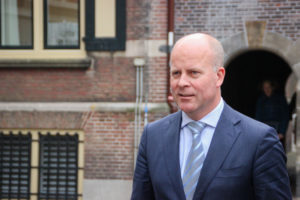Confusion and uncertainty about help from The Hague
 PHILIPSBURG – “We are one Kingdom, we are all in the same boat and will help each other,” said Minister Raymond Knops (CDA) of the Interior and Kingdom Relations ten days ago. But after the reunion of the Kingdom Council of Ministers, last Friday, he pointed to the islands’ own responsibility and said that if the Netherlands makes money available, it should come back into the Dutch treasury.
PHILIPSBURG – “We are one Kingdom, we are all in the same boat and will help each other,” said Minister Raymond Knops (CDA) of the Interior and Kingdom Relations ten days ago. But after the reunion of the Kingdom Council of Ministers, last Friday, he pointed to the islands’ own responsibility and said that if the Netherlands makes money available, it should come back into the Dutch treasury.
St. Maarten, Curaçao and Aruba have asked the Netherlands for help to deal with the corona crisis on the islands. Aruba has forty registered corona infections since Saturday morning. None of the sick have died. The number of infections with COVID-19 on Curaçao has risen to nine. A patient from the Netherlands died in the hospital in Willemstad. Both Aruba and Curaçao have set the curfew, public life has almost come to a standstill.
The tourism dependent islands are in financial need and are also in great need of technical assistance. Minister Knops has indicated that he “will not abandon the autonomous countries in the Kingdom”, but does not indicate when the Netherlands will provide assistance and what it will consist of. “We will now assess the requests for help,” says Knops, who says that the requests will be assessed on “reasonableness”.
In a letter to the Dutch government, Aruban Prime Minister Evelyn Wever-Croes (MEP) asked for an amount of 400 million euros; EUR 250 million to make up for the budget deficit and EUR 150 million as an infusion for businesses. Aruba asks the Netherlands for a donation, but according to Knops this cannot be the case. “Because it concerns Dutch tax money. Here in the Netherlands we have also asked sacrifices from people. So that’s also the message to the prime ministers of the three countries.”
Knops points out once again that the autonomous countries themselves are responsible for their public finances. He referred to European countries that, according to the minister, are in the same situation and have very high debts. “They, too, are now asking the Netherlands for help,” said Knops on Friday, ignoring that the Netherlands are being strongly condemned by EU leaders for its political response to the corona crisis. Thursday evening, after a disastrous EU summit on ‘corona bonds’, the Netherlands was the target of a twitter storm. According to French Prime Minister Macron the Dutch political stance “could spell the end of the EU.”
On Thursday, during the six-hour video conference of EU leaders, it became clear that Dutch finance minister Wopke Hoekstra is one of the four key moneymen standing in the way of a concerted European plan to face the economic recession caused by Covid-19. Hoekstra suggested the EU “should investigate countries like Spain that say they have no budgetary margin to deal with the effects of the crisis provoked by the new coronavirus in spite of the fact that the Eurozone has grown for seven consecutive years”.
Portugal’s Prime Minister, António Costa, is outraged by the attitude of the Netherlands. After the summit, he told journalists that Hoekstra’s discourse was ‘repugnant’. “No one wants to hear the Dutch finance minister say what was said in 2009, 2010 and 2011. Spain did not import the virus. The virus hits everyone equally. If one country in the European Union thinks it can resolve the problem by leaving the virus in other countries, it doesn’t understand what the European Union is…” Mr Costa accused Hoekstra of “absolute unconsciousness” and a “recurring meanness” that “completely undermines what the spirit of the EU is” and which is a threat to the future of the EU itself. “If we don’t respect one another, don’t understand one another, lack the capacity to respond in unison to a common challenge, then no one understands anything about the European Union”.
Via Twitter the Portuguese prime minister was getting praise for putting Holland in its place. EU leaders are going to ask Eurogroup finance ministers to explore the subject further and report back in two weeks’ time.
It is clear that there are as yet no answers to pressing questions. The Caribbean islands also have to wait. For the Committee for Financial Supervision (CFT) it is clear that St. Maarten and Curacao will not be able to comply with the legal norm of a balanced revenue account to comply with Article 15 of the Kingdom Law on Financial Supervision in 2020, and that Aruba won’t be able to comply with Article 14 of the Aruba Financial Supervision Law. The CFT advised the Kingdom Council of Ministers to agree to a deviation from the central budget norm and the allow the Dutch Caribbean countries to have a budget deficit.
###
Related articles:
CFT: decision about liquidity support by April 15
St. Maarten needs massive financial support
Opinion: A nightmare scenario


























